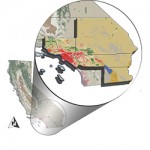 The 2014 Southern California Regional Progress Report was prepared by researchers with the School of Social Ecology’s Metropolitan Futures Initiative, which aims to build a base of knowledge to guide policymakers in improving the overall quality of life in the Southland. It is the second installment in a biennial series of Regional Progress Reports.
The 2014 Southern California Regional Progress Report was prepared by researchers with the School of Social Ecology’s Metropolitan Futures Initiative, which aims to build a base of knowledge to guide policymakers in improving the overall quality of life in the Southland. It is the second installment in a biennial series of Regional Progress Reports.
Three faculty members, six graduate students and three undergraduates collected data from 17 sources on the region’s demographic, social and economic landscape. It allows for systematic statistical analyses at the county, city, neighborhood and street-block levels over a 20 year period: 1990-2012.
The report draws on this unprecedented data set to explore: 1) why do certain types of land use development occur in some locations rather than others; 2) which land use characteristics and demographic characteristics explain the neighborhoods across the region that exhibit the most economic vitality over time; 3) what land use characteristics around parks explain which parks have the most crime, and which land characteristics explain which blocks near parks have the most crime; 4) how can these statistical models help us understand the possible consequences of future development, using the Great Park area in Irvine as a test case.
The report is intended to serve as a catalyst for evidence-based dialogue that will inform planning for the future. Subsequent biennial reports will continue to monitor trends and expand the domain of coverage to include, for example, health and welfare.